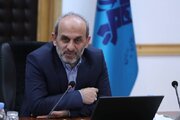Iranian MPs response differently to this question, some immediately deny it without further elaboration; some others confirm it but observe the issue from an expert view; and several others see as it as a political approach originated from the circles inside and outside the Majlis.
A principlist MP, Mohammad Hossein Farhangi who is among the supporters of the government belongs to the first group. Speaking to Khabar, he said that there is not a particular disagreement between the government and the Majlis and does not feel necessary to draw on the issue. He is also a member of the task force mediating the government and the Majlis to resolve the differences between the two entities on subsidy reform bill, "Although the government and the Majlis challenge over the bill and a delay has occurred on the final decision about the issue, but all these are connected to expertly and executive subjects. The same position is expressed by one of the other MPs, Hamid Reza Katouzian who rejects the involvement of political orientations in such expertly debates.
Referring to the nature of relations between the government and the Majlis and inevitable differences on some key projects and deals, Fatemeh Alia an MP who is a member of the Islamic Revolution fraction of Majlis explained: "Usually the government views some decisions made by the Majlis as impossible to be executed. So it begins negotiating with the lawmakers and interacts with some special committees." She stressed that it can not be called as disagreement and blamed the problem on media, "At times media and even Islamic Republic of Iran's Broadcasting (IRIB) use some headlines which distort public opinion to believe that there are huge gaps between the two bodies, but it's not true."
She went on to say that the government has no expectation from the Majlis on decisions made on less significant projects and bills, "The unavoidable differences usually occur on important projects and bills including budget bills or subsidy reform bill or rationing gasoline. The government explores shortest way to execute the projects, but the Majlis insists on its right for lawmaking and supervision, but such differences should not be seen as conspicuous."
The other member of Islamic Revolution fraction of Majlis, Mahmoud Ahmadi Biqash also believes that some hands are involved in widening the gap between the government and the Majlis. Speaking to Khabar he asserted that some who have political motives try to undermine both the achievements of the government and national interests: "In the 10th presidential election, these people were after the victory of any candidate except Mahmoud Ahmadinejad and believed that he should not take the presidential office. Nowadays they also they don't recognize any success in the name of the government and Ahmadinejad himself. They intend to pour oil on the flames and represent the government as impotent."









نظر شما